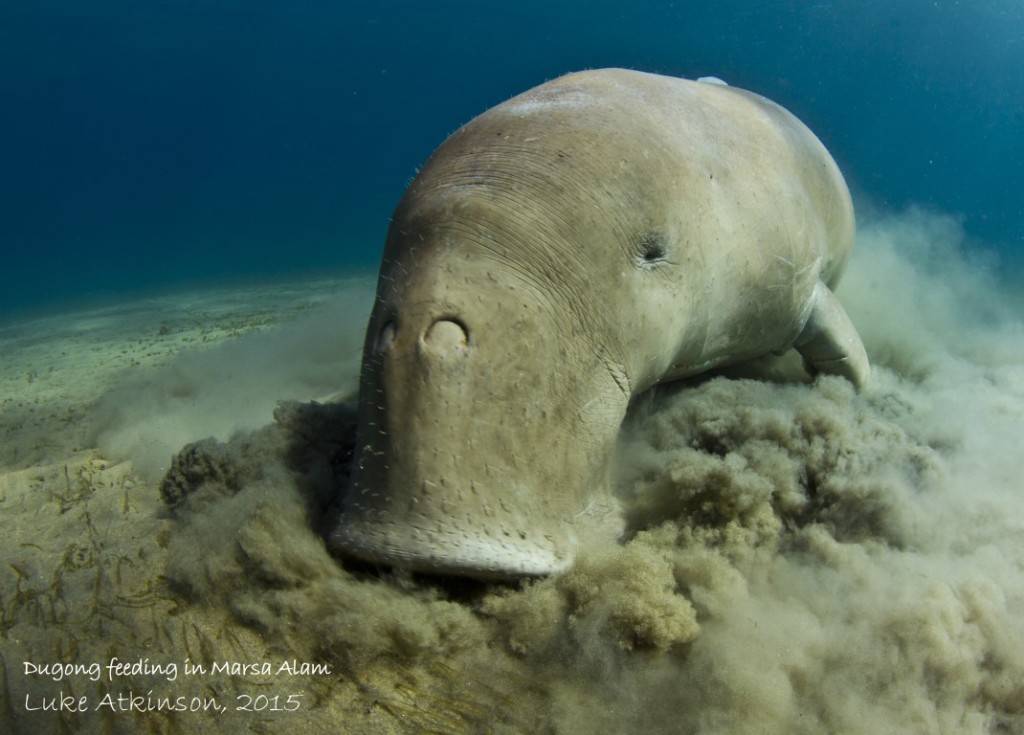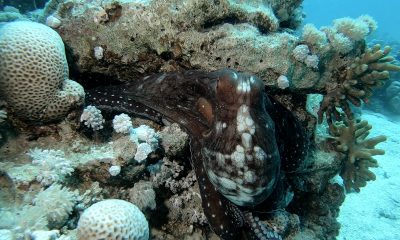News
Words from a Red Sea Dweller
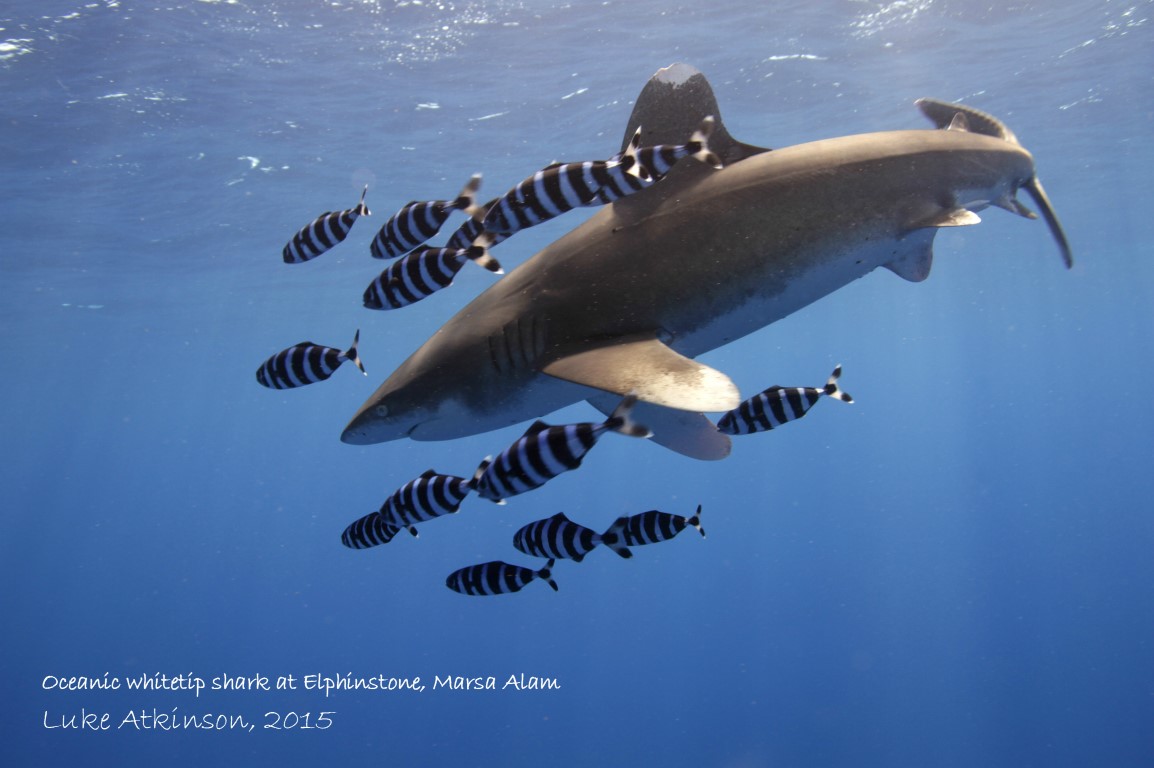
Emperor Divers Regional Area Manager, Luke Atkinson, spells out the reality of safety in the Red Sea
I’m an ex-pat, which is a posh way to say immigrant, and have been for the past seven years. I like the quiet life, so as soon as I set eyes upon Port Ghalib on the south of Egypt’s Red Sea coast, I knew it was where I wanted to call ‘home’. It has a small community, a smattering of bars and restaurants and a very simple landscape of vast yellow desert and even vaster blue sea. It is such a sleepy place, that in my seven years the most threatening thing to have happened was a brief dust up between a few dive guides and a couple of amateur boxers in (the once popular but now closed) TGI Fridays. And a donkey once gave me a peculiar look. Frightening stuff.
You’ll know Port Ghalib if you’ve been on one of the many liveaboards that depart from here, often going to Brothers Islands or Daedalus and occasionally further south. Or, you’re one of the relatively few divers that have been this far south on a land-based trip. For those that don’t know, it is a small private, modern development right next to Marsa Alam airport (RMF), almost exactly 200km South of Hurghada (HRG). It has never been inundated with holidaymakers, mainly because the airport does not receive many flights (only one per week from the UK) but divers have usually been savvy enough to find a way down via Hurghada. Those that come are rewarded with exceptional coral reefs, regular sightings of the rare dugong, and pelagic encounters on famous reefs like Elphinstone.
I came to Egypt in early 2009 to begin my career as a Dive Instructor having cut my teeth part time in the UK as a Divemaster (playing dead in the corners of Stony Cove, waiting an age for the next Rescue Diver student to locate me and inevitably flood my drysuit with icy water while they grappled me to the surface). The full time job paid the bills but the diving was what I lived for and so the opportunity to combine the pleasure with the pay was too much to resist – quit boring job, rent out apartment, store possessions, pack bags, go. Oh, and bring the missus.
Since 2009, I have seen three major news items hit the TV about this country, each one rocking the tourism industry; the Arab Spring of 2011, the ouster of the Islamist presidency of summer 2013 and most recently the plane incident on Sinai in October 2015. I’m not even going to include that recent (January 2016) nonsense in Hurghada that should have barely made national news, let alone front page international “news” (I’m being kind to the Daily Mail there). Thankfully for the latter incident, the Foreign Office and credible news outlets waited for the facts to come out before splashing their opinions all over the place, and rightly ignored it as the scuffle it was. So back to the three major incidents, and how I viewed them as a resident and insider. Not surprisingly, I saw events unfold in the exact same way most Brits would have, namely clutching a cold beer and watching the TV. Probably the only difference being I was wearing flip flops and shorts.
Cairo is a long, long way away from the Red Sea, the closest resort being Hurghada at a mere 280 miles or so, Marsa more like 400. I know this, as I recently had to travel there to go and see Star Wars: The Force Awakens (hey, I was born in 1978 and I’m called Luke – what choice do I have?). My options were either a seven-hour car journey or a one-hour flight, hardly next door. So to be worried about whether events in Cairo would spill over, while sitting in a bar in a Red Sea resort, would be like someone in Seahouses (if you’ve not been there, you haven’t done some of the best UK diving on offer!) worried about the London rioters knocking on their door in August 2011. For those who worked in the Egyptian diving industry during these events, the worry was never safety. I never saw a thing firsthand that would have told me anything was amiss in Cairo. The worry was, and still is today, what will be the impact on the number of divers coming out?
The latest incident regarding the plane downing in Sinai late last year caused a response by the Foreign Office to put flights into and out of Sharm on hold, while the cause was investigated alongside a review of Egyptian airport security. The effect on Sharm has been colossal with many hotels and some dive centres closed at least temporarily whilst some have packed up for good. It’s a little bit difficult to watch and this well written article in the Gulf news by a British journalist makes some very good points about the scale of the reaction to that incident and even has a poll at the end (you have to pick an answer to see the result), which shows to me that most people really do have their heads screwed on right.
It’s difficult for those who have never been to the Red Sea before to visualise the Egyptian Red Sea as a peaceful and welcoming place since the media has inevitably tarred the whole of Egypt with a very large brush. I’m sure those that have been before know, when they stop to think, that a trip to Sharm, Hurghada or Marsa Alam would be safe but are still maybe hesitating. We are very good at focusing on ourselves and our own (sometimes inaccurate or misled) intuitions instead of facts; it’s for that reason for example that people often find it difficult to intuit that in any 23 random people, there is a greater than 50% chance that two share the same birthday. It’s true, look it up. And so it is, if you find yourself hesitating about an upcoming Red Sea dive trip, it’s the misleading part of your intuition at work.
The facts about the Red Sea are clear. It is the closest warm water coral reef diving to the UK at five hours by plane. It is one of the best value diving destinations available to Brits. There are world class events to be seen such as the fish schooling of Ras Mohamed, as well as possible encounters with sharks, mantas, dolphins, dugong and turtles to name but a few. The visibility is usually a spectacular 30m+ and the water temperature ranges from 22C to 30C. There are wrecks of every shape and size to suit divers of all ability. There is a phenomenal tourism infrastructure, hotels of every class, liveaboard vessels, dive boats and transportation on hand everywhere. The diving is regulated and safe, with professional licensed outfits available in all the main resorts as well as a large network of hyperbaric chambers should one need. The local people are always hospitable and are especially welcoming to British nationals who traditionally have supported Egypt at times when other nationalities have not. And, most pertinently, it is safe to holiday here. As I said, I am sure most of you believe this deep down anyway but for those who don’t, just look at the Foreign Office advice. Hurghada – green. Sharm El Sheikh – green. Marsa Alam – green. Even Cairo – green (which suited my cinema ambitions). They quote “Over 900,000 British nationals visit Egypt every year. Most visits are trouble-free. The same is true for all the major European advices; Germany, France, Netherlands, Switzerland, Italy etc. I’m no mug; I wouldn’t live here if I doubted my safety.
Unsurprisingly the national response has not been covered in the international press as widely as the incidents themselves. Boring news does not sell papers. Egypt needs tourism; it is a huge and vital part of the country’s revenue. And so while I think you would have to go a long way to find someone in the Egyptian government who considers the sudden drop in tourism fair or justified, they have been forced to react positively. I bashed the Daily Mail earlier, so it’s only fair to include an article they ran somewhere in their back pages recently. As well as an investment in resort security, there has been work behind the scenes on airport security. British government representatives have recently been over to Egypt and have voiced their approval at the decision to use an international private company, Control Risks, to audit and strengthen security at airports, although you have to dig very deep for this news.
Since Egypt also recently finalised their democratic government with the first session of parliament for three years, another British government delegation which was there to see the inaugural session, “affirmed they would recommend the resumption of British air flights to Sharm El Sheikh upon their return to the UK”, which again was hardly reported.
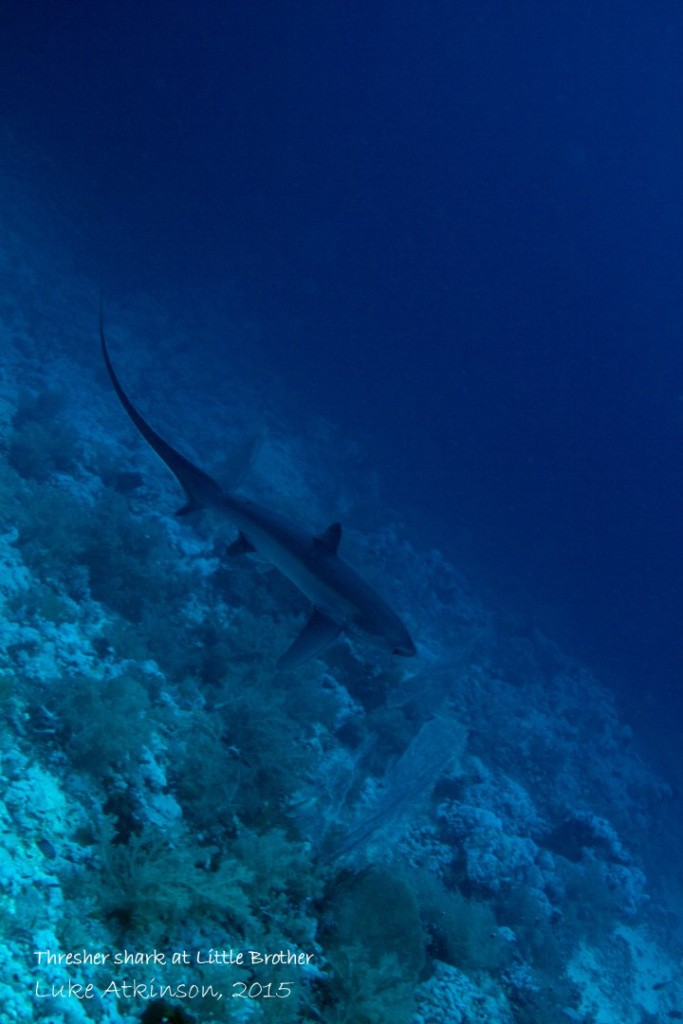 For you, the savvy diver, this is all good news indeed, albeit news you probably would not have seen. So, Egypt is safe as the FCO advises, yet it is spending significantly to further secure its resorts. Egypt has also shown a quick and welcomed response to improving airport security to eradicate the one ban that does currently apply at Sharm airport. Diving in Egypt in the past few years has just got better and better; 2015 must go down as one of the best ever, certainly in the past 10 years. Ras Mohamed had fish schools of epic proportion, Brothers, Daedalus and Elphinstone had near ever present shark sightings (hammerhead, whale shark, grey reef, thresher and oceanic whitetip to name a few) from May to December and even Rocky Island in the far south had tiger sharks for two months. It could be asserted that perhaps there were too many divers in the years leading up to 2011 with reports of overcrowding on popular reefs and wrecks and nowhere near as many pelagic sightings as we have had recently. Since the masses will be hesitating about coming to the Red Sea, there is an opportunity for savvy divers in 2016 to experience the resorts and diving like never before. Reefs should be uncrowded, deals should be plentiful, and the diving spectacular. You can book for Marsa or Hurghada right now and expect the Sharm airport situation to be resolved in time to allow summer (which is the prime time for the Ras Mo fish schooling) trips there.
For you, the savvy diver, this is all good news indeed, albeit news you probably would not have seen. So, Egypt is safe as the FCO advises, yet it is spending significantly to further secure its resorts. Egypt has also shown a quick and welcomed response to improving airport security to eradicate the one ban that does currently apply at Sharm airport. Diving in Egypt in the past few years has just got better and better; 2015 must go down as one of the best ever, certainly in the past 10 years. Ras Mohamed had fish schools of epic proportion, Brothers, Daedalus and Elphinstone had near ever present shark sightings (hammerhead, whale shark, grey reef, thresher and oceanic whitetip to name a few) from May to December and even Rocky Island in the far south had tiger sharks for two months. It could be asserted that perhaps there were too many divers in the years leading up to 2011 with reports of overcrowding on popular reefs and wrecks and nowhere near as many pelagic sightings as we have had recently. Since the masses will be hesitating about coming to the Red Sea, there is an opportunity for savvy divers in 2016 to experience the resorts and diving like never before. Reefs should be uncrowded, deals should be plentiful, and the diving spectacular. You can book for Marsa or Hurghada right now and expect the Sharm airport situation to be resolved in time to allow summer (which is the prime time for the Ras Mo fish schooling) trips there.
There are no guarantees in life, but if you look at the facts rather than the tabloid tales they chose to sell papers and decide rationally rather than intuitively, then you will see that rather than thinking to give the Red Sea a miss for the time being, it is exactly the time to come and dive here. If you do, I’d love to share a cold beer with you. Bring your own shorts and flip flops.
![]() Luke is Area Manager of Emperor Divers in Marsa Alam and Hamata. For more information about Emperor Divers visit www.emperordivers.com.
Luke is Area Manager of Emperor Divers in Marsa Alam and Hamata. For more information about Emperor Divers visit www.emperordivers.com.
Marine Life & Conservation
Double Bubble for Basking Sharks

 The Shark Trust is excited to announce that, for two more days only, all donations, large or small, will be doubled in the Big Give Green Match Fund!
The Shark Trust is excited to announce that, for two more days only, all donations, large or small, will be doubled in the Big Give Green Match Fund!
Donate to Basking in Nature: Sighting Giants
The Shark Trust is hoping to raise £10k which will be doubled to £20k. This will go towards Basking in Nature: Sighting Giants. And they need YOUR help to reach they’re goal.
The Shark Trust’s citizen science project is to monitor and assess basking sharks through sightings; encouraging data collection, community engagement, and promoting nature accessibility. This initiative aims to enhance health and wellbeing by fostering a deeper connection with British Sharks.
Campaign Aims
- Increase citizen science reporting of Basking Sharks and other shark sightings to help inform shark and ray conservation.
- Provide educational talks about the diverse range of sharks and rays in British waters and accessible identification guides!
- Create engaging and fun information panels on how to ID the amazing sharks and rays we have on our doorstep! These can be used on coastal paths around the Southwest. With activities and information on how you can make a difference for sharks and rays!
- Promote mental wellbeing through increasing time in nature and discovering the wonders beneath the waves!
Donate, and double your impact. Click Here
Blogs
Northern Red Sea Reefs and Wrecks Trip Report, Part 1: Welcome to Adventure
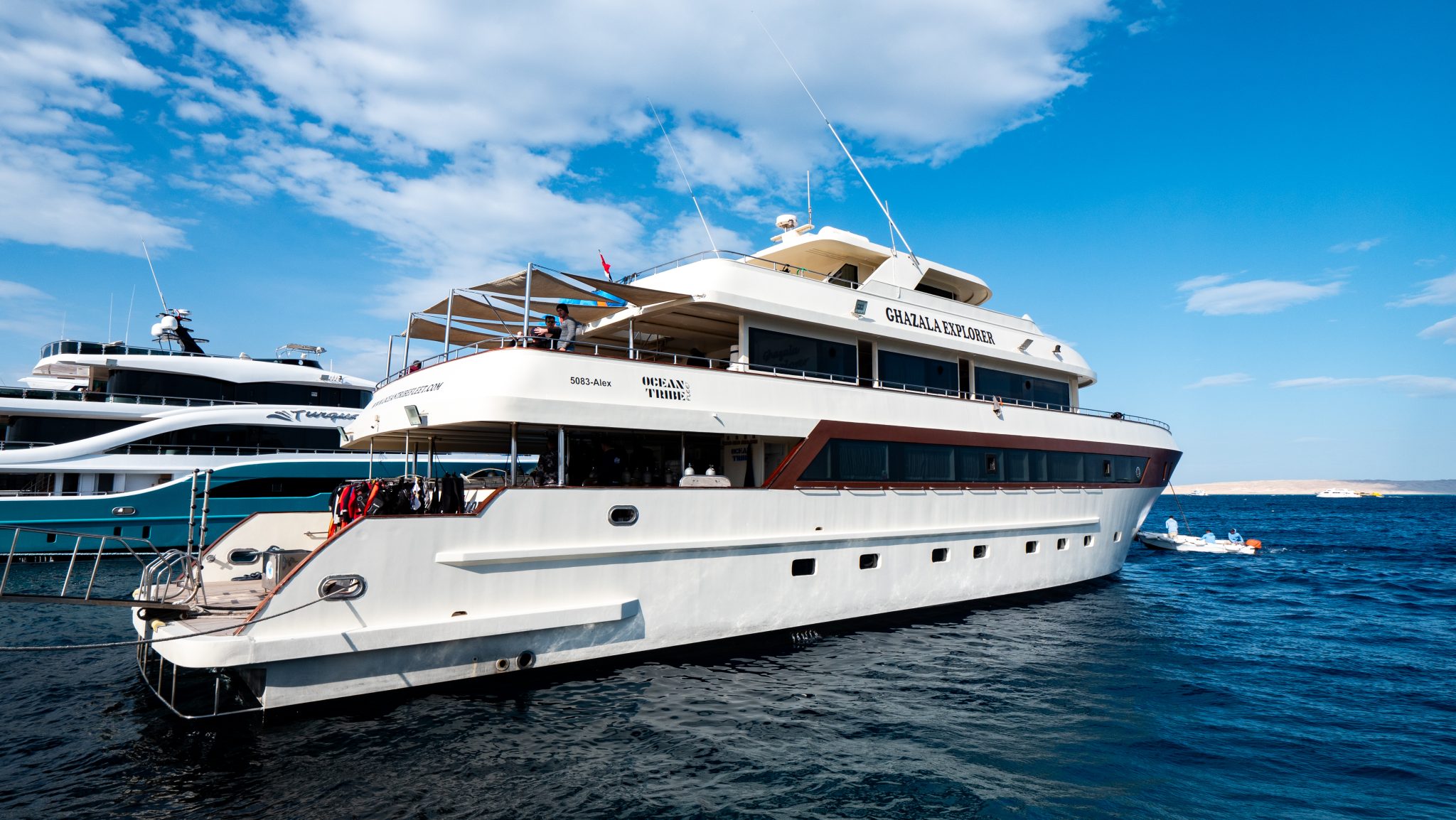
Jake Davies boards Ghazala Explorer for an unforgettable Red Sea diving experience…
The Red Sea is known for its range of dives, from bright, colourful reefs with a diverse array of reef species to world-famous wrecks scattered along its numerous atolls. The reefs and wrecks of the North Red Sea are one of the best ways to experience many of these.
Organised by dive tour operator specialist Scuba Travel, Ghazala Explorer was going to be home for the week for this exciting trip, a 37m steel-hulled vessel with top-class reviews by previous guests.
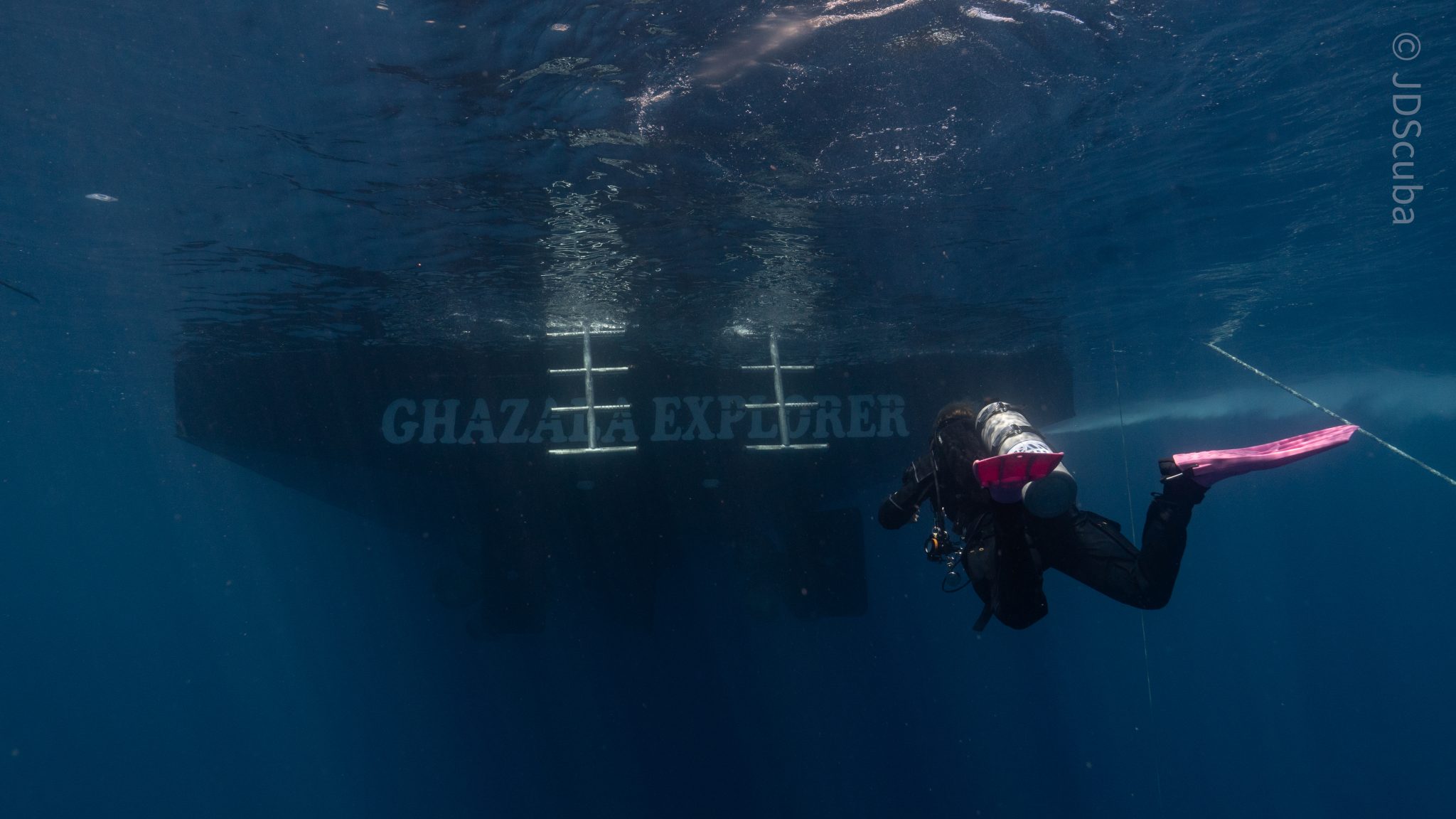
Departing from Hurghada, the plans were to head north for the first couple of days, including check dives on Global reefs, before then heading to see a few of the wrecks at Abu Nuhas reef. Then we would head across the Gulf of Suez into Ras Mohammed National Park to see what are considered to be some of the best reef dives in the Red Sea. From there, we would head to the Strait of Tiran for a day, then head back south to dive the world-famous wreck and one of the trip’s highlights: the SS Thistlegorm. This would include a night dive prior to heading back for the final day’s diving around Hurghada before heading back to port.
Arriving from Gatwick into Hurghada late in the evening, the Scuba Travel rep was waiting for arrivals ready to take us all to the Ghazala Explorer, docked in Hurghada’s New Marina. Stepping onboard, the high-quality and spacious deck spaces and interior provided an instant sense of comfort. There was a friendly welcome by the crew and guides. After some food, it was time for the boat briefing, which was detailed and covered all the important safety aspects of the vessel and procedures. The kit was then set up in the allocated spaces, and the spacious tables in the interior provided the perfect place to build up my camera ahead of the week’s trip. As soon as everything was done, it was time to head to the cabin to get some rest before an early start for a check dive.
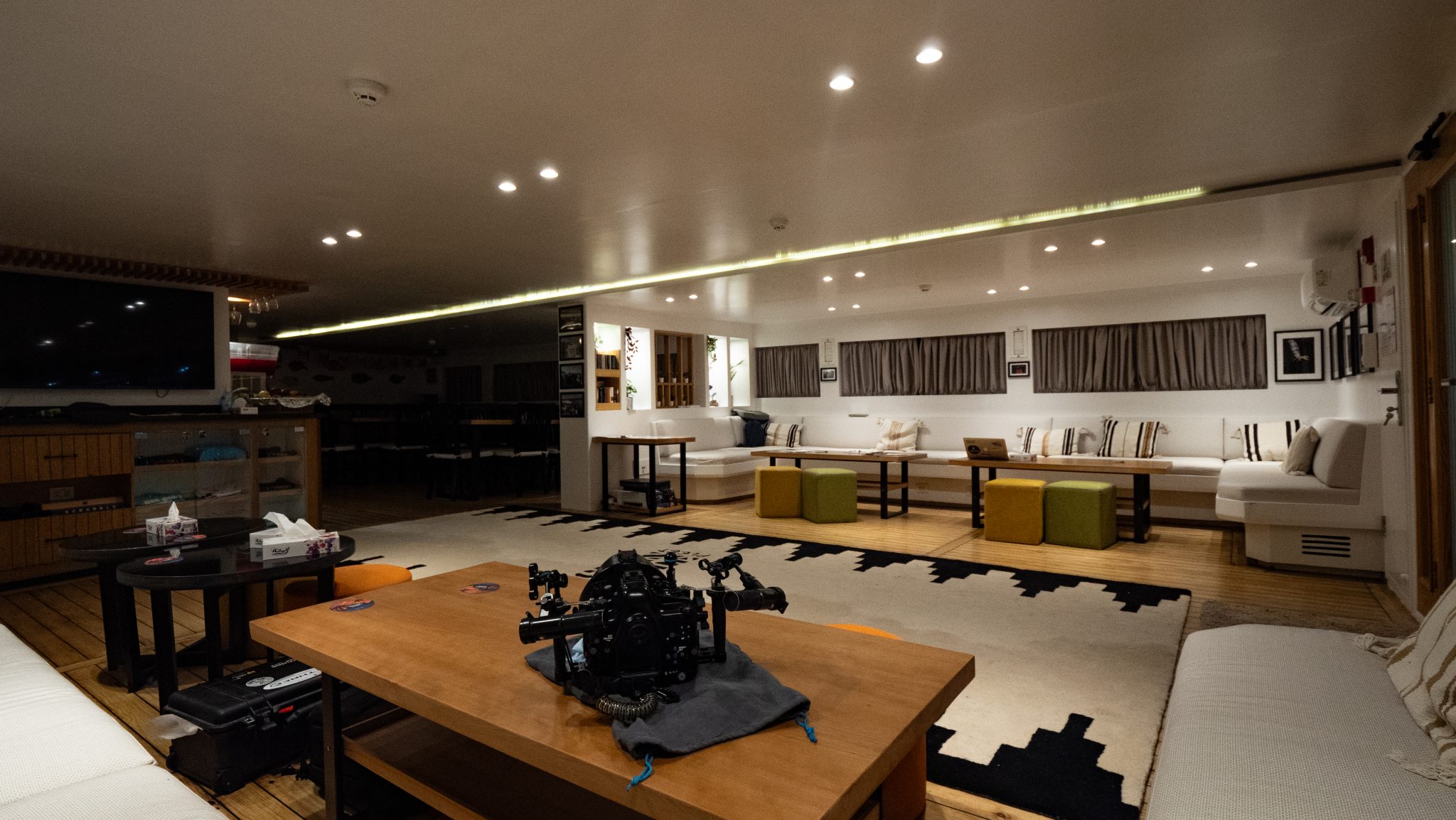
The northerly wind provided a chop, but it wasn’t felt as the steel hull of the vessel cut through each wave. By mid-morning, we were moored up at the reef at Gobal Island, sheltered from the chop on the other side. With Ahmed providing a detailed briefing, it was time to kit up and get in the water to explore some of the reefs below during the check dive. It’s always exciting to stand on the stern of the boat, looking into the clear blue water before taking a stride entry to enter the colourful coral scenery below.
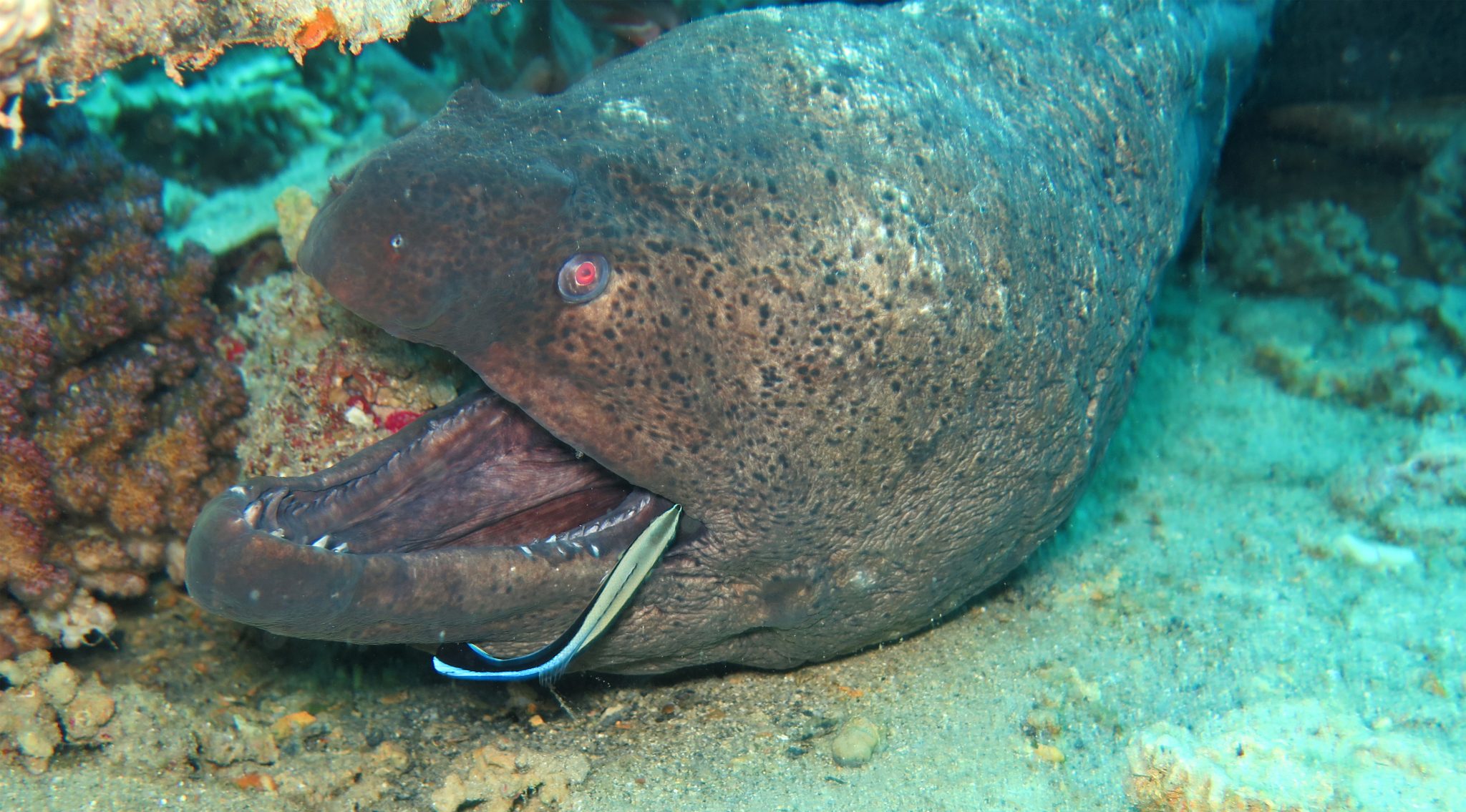
Like most of the dives on coral reefs in the Red Sea, the colours and busyness of the reefs were great to see. It was great to be back on the reefs, taking the time to watch the many species which make up the Red Sea ecosystems before picking out a few to film and photograph. The time flies by as you are constantly engaged with the surroundings, and then before I knew it, it was time to head back onboard, where everyone coming back from the water had big smiles and were full of excitement and anticipation for the rest of the week.
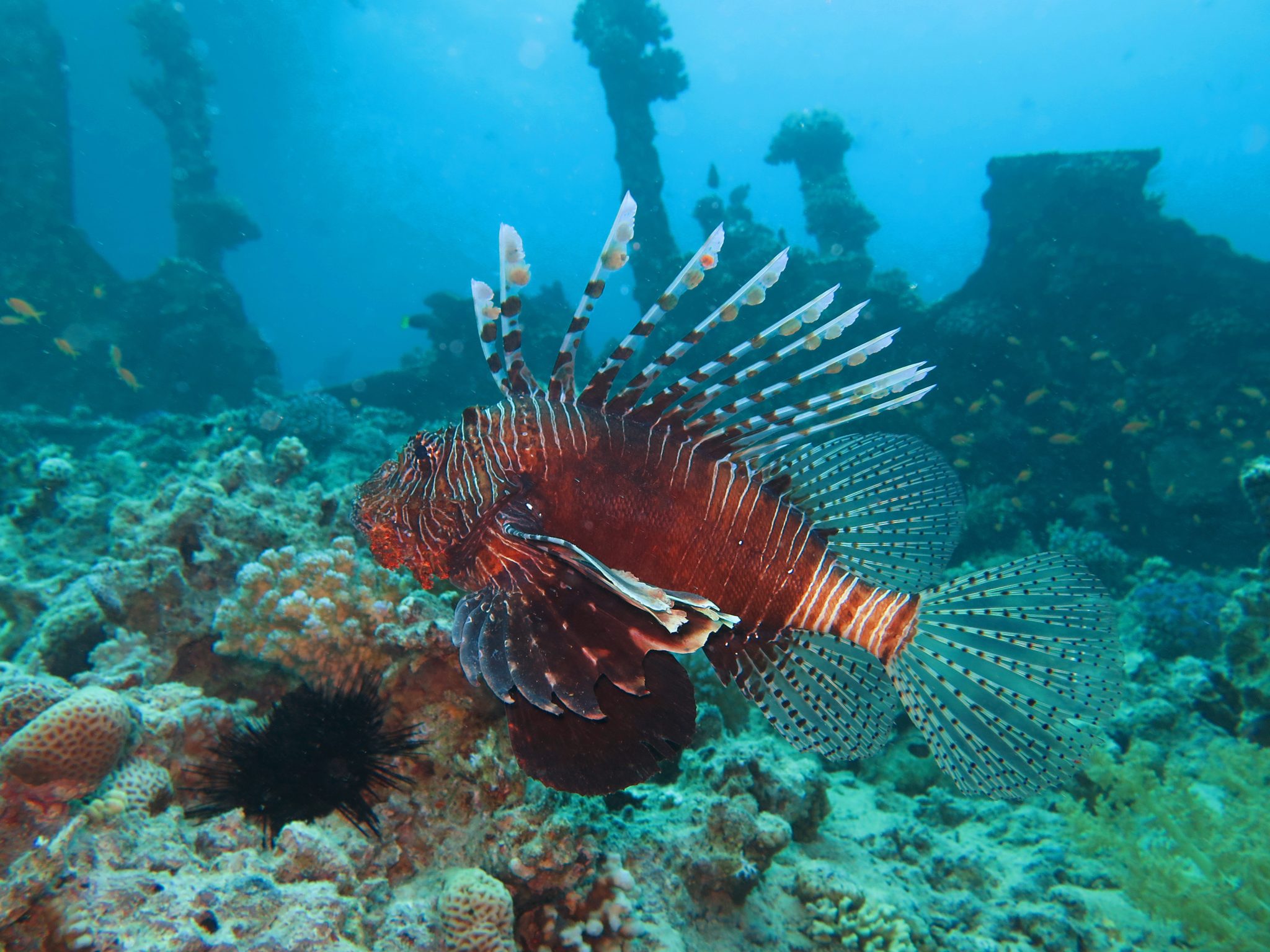
The next two dives, which included the night dive, were on the wreck of the barge, where very little remains act as an artificial reef for many species, which included a few perfectly hidden large stonefish and a crocodile fish camouflaging on the sand beneath the hull. Looking up though was the highlight of the dive, as a squad of squid could be seen mid-water, dancing around. Ascending slowly and calmly, I was able to position myself amongst the squad for the opportunity to get a few close-ups of this great species. Shortly after, the squid were then accompanied by a shoal of halfbeaks just below the surface. Everywhere was just full of life!
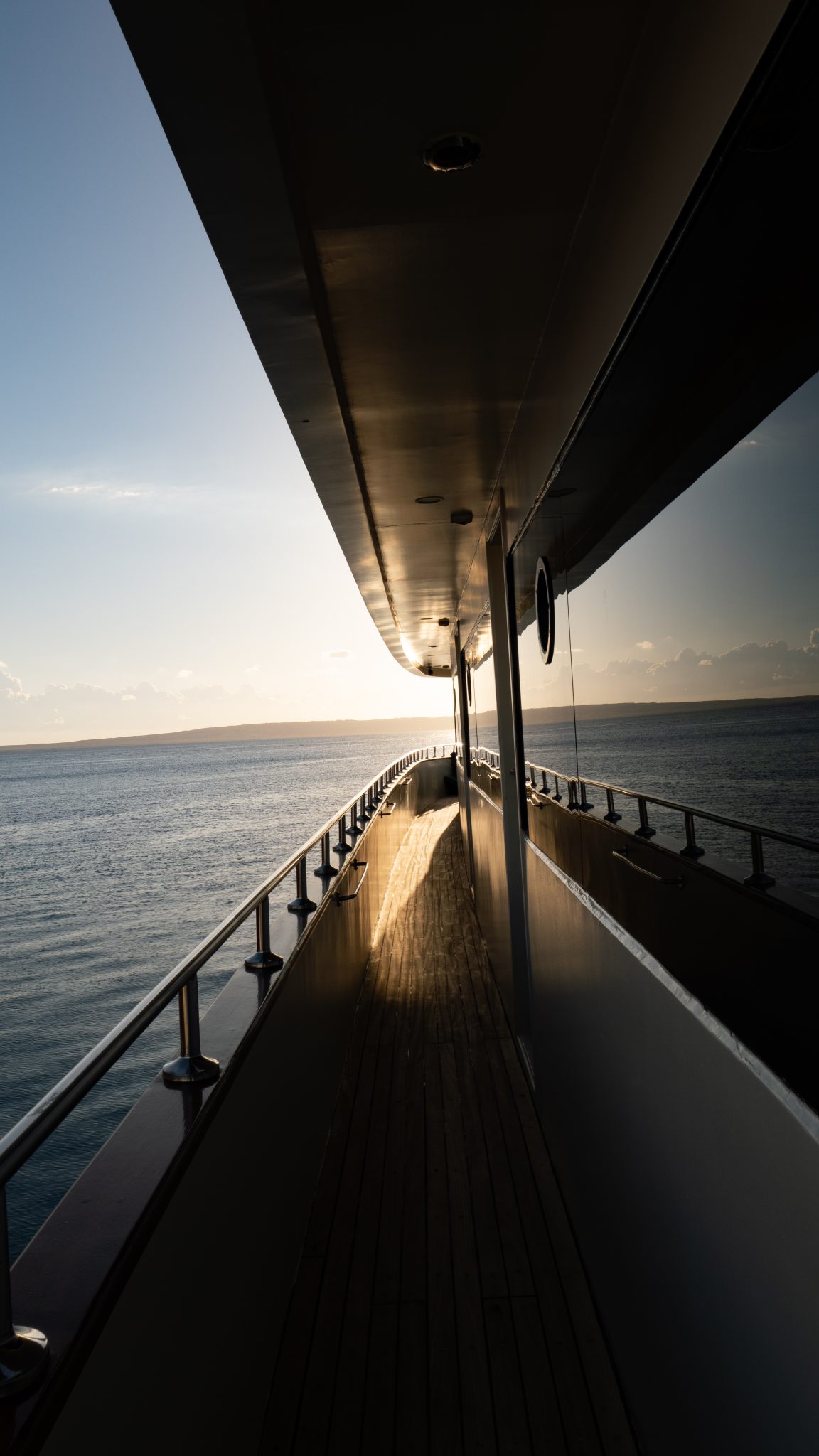
After some afternoon snacks, and as part of the safety protocols of the vessel, it was time to practice an emergency drill to put the briefings into action. The fire alarm rang, and we then had to carry out a full drill of getting the life jackets and using the closest emergency exits to then gather at the muster point on top deck where we would then have a run-through of the life rafts. The drill was great to do and I thought it was a really important part of the boat’s safety, as it was an opportunity to use the emergency exits to ensure a safe and effective evacuation, while also convening at the muster station to go through different scenarios and become familiar with some of the kit used during these emergencies.
Check in for Part 2 from Jake tomorrow!
To find out more about the Northern Red Sea reef and wrecks itineraries aboard Ghazala Explorer, or to book, contact Scuba Travel now:
Email: dive@scubatravel.com
Tel: +44 (0)1483 411590
Photos: Jake Davies / Avalon.Red
-

 News3 months ago
News3 months agoHone your underwater photography skills with Alphamarine Photography at Red Sea Diving Safari in March
-

 News2 months ago
News2 months agoCapturing Critters in Lembeh Underwater Photography Workshop 2024: Event Roundup
-

 Marine Life & Conservation Blogs2 months ago
Marine Life & Conservation Blogs2 months agoCreature Feature: Swell Sharks
-

 Blogs2 months ago
Blogs2 months agoMurex Resorts: Passport to Paradise!
-

 Blogs2 months ago
Blogs2 months agoDiver Discovering Whale Skeletons Beneath Ice Judged World’s Best Underwater Photograph
-

 Gear Reviews2 months ago
Gear Reviews2 months agoGear Review: Oceanic+ Dive Housing for iPhone
-

 Marine Life & Conservation2 months ago
Marine Life & Conservation2 months agoSave the Manatee Club launches brand new webcams at Silver Springs State Park, Florida
-

 News3 months ago
News3 months agoWorld’s Best Underwater Photographers Unveil Breathtaking Images at World Shootout 2023


